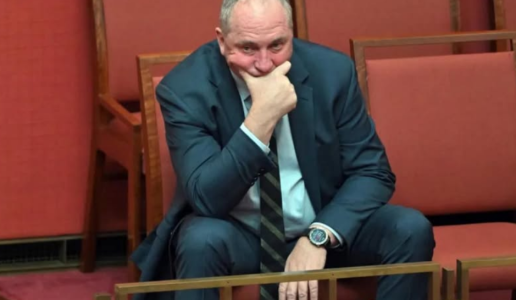Nationals MP reveals cancer diagnosis after noticing small detail
By
Gian T
- Replies 12
In the world of politics, it’s not often we see our leaders drop the mask and share their most personal battles.
But that’s precisely what former Deputy Prime Minister and Nationals MP has done, opening up about his recent diagnosis and fight with cancer—a revelation that’s resonated with many Australians, especially men over 60.
Barnaby Joyce’s story is a powerful reminder that sometimes, the most serious health issues can sneak up on us with barely a whisper.
Speaking candidly on Sunrise, Joyce admitted that he didn’t feel particularly unwell before his diagnosis.
‘That’s the problem with prostate cancer,’ he said. ‘You go to the toilet a bit more than you should, but you don’t feel bad.’
For many men, changes in urinary habits can be easy to dismiss as just another part of getting older.
But as Joyce’s experience shows, these subtle signs can be the body’s way of waving a red flag.
It was only after a routine prostate-specific antigen (PSA) blood test—thanks to the insistence of his diligent GP—that Joyce discovered his PSA levels were elevated.
This led to further tests, including an MRI and a biopsy, which confirmed the diagnosis.
In a move that surprised some, Joyce chose to keep his diagnosis private during the recent election campaign.
‘I didn’t want a big circus going on during the election, which inevitably would happen,’ he explained.
Instead, he waited until the polls had closed and his New England seat was secure before sharing his news.
For Joyce, the decision was about keeping the focus on the issues that mattered to voters, not his personal health.
‘I wanted the campaign to focus on the campaign, and I didn’t think this issue needed to be a part of that,’ he said.
It’s a sentiment many of us can relate to—sometimes, we just want to get on with life without making a fuss.
Even as he prepared for surgery, Joyce’s trademark down-to-earth attitude shone through.
On the morning of his operation, he joked about having to fix a flat tyre on his truck before heading to hospital.
‘I will fix that up, then going straight down the road and straight into surgery,’ he told Sunrise.
Joyce’s surgery was scheduled just as his supporters were celebrating his election win—a stark reminder that life’s challenges don’t wait for a convenient moment.
Joyce’s story has a happy ending—his cancer was caught early, and he’s expected to make a full recovery.
‘Prostate cancer, if you get it early, is very, very treatable; in fact, about 97 per cent successful,’ he said. ‘So I’m very blessed and lucky to discover this early.’
He credits his GP for insisting on the PSA test, and he’s urging other men to follow suit.
‘If I thought it was very serious, ofcourse, I’d resign, but my doctors or surgeons say, "You’re very lucky you’ve got it early."’
Prostate cancer is the most commonly diagnosed cancer in Australian men, with over 24,000 new cases each year.
The risk increases with age, particularly for men over 50, and even more so if there’s a family history.
The good news is when detected early, the survival rate is extremely high.
Symptoms can be subtle—frequent urination, especially at night, difficulty starting or stopping urination, or a weak stream.
Sometimes, there are no symptoms at all, which is why regular check-ups and PSA tests are so important.
For many blokes, talking about health—especially anything ‘down there’—can feel awkward or embarrassing.
However, as Joyce’s experience shows, a simple conversation with your GP could save your life. Early detection is key, and there’s no shame in looking after yourself.
Barnaby Joyce’s story is a timely reminder for all of us—don’t ignore the signs, and don’t put off those regular check-ups.
If you’re over 50 or have a family history of prostate cancer, talk to your doctor about getting a PSA test.
It could be the most important conversation you have this year.

Have you or someone you know been affected by prostate cancer? Do you have advice or words of encouragement for others facing a similar journey? Share your thoughts and experiences in the comments below—your story could help someone else take that all-important first step.
But that’s precisely what former Deputy Prime Minister and Nationals MP has done, opening up about his recent diagnosis and fight with cancer—a revelation that’s resonated with many Australians, especially men over 60.
Barnaby Joyce’s story is a powerful reminder that sometimes, the most serious health issues can sneak up on us with barely a whisper.
Speaking candidly on Sunrise, Joyce admitted that he didn’t feel particularly unwell before his diagnosis.
‘That’s the problem with prostate cancer,’ he said. ‘You go to the toilet a bit more than you should, but you don’t feel bad.’
For many men, changes in urinary habits can be easy to dismiss as just another part of getting older.
But as Joyce’s experience shows, these subtle signs can be the body’s way of waving a red flag.
It was only after a routine prostate-specific antigen (PSA) blood test—thanks to the insistence of his diligent GP—that Joyce discovered his PSA levels were elevated.
This led to further tests, including an MRI and a biopsy, which confirmed the diagnosis.
In a move that surprised some, Joyce chose to keep his diagnosis private during the recent election campaign.
‘I didn’t want a big circus going on during the election, which inevitably would happen,’ he explained.
Instead, he waited until the polls had closed and his New England seat was secure before sharing his news.
For Joyce, the decision was about keeping the focus on the issues that mattered to voters, not his personal health.
‘I wanted the campaign to focus on the campaign, and I didn’t think this issue needed to be a part of that,’ he said.
Even as he prepared for surgery, Joyce’s trademark down-to-earth attitude shone through.
On the morning of his operation, he joked about having to fix a flat tyre on his truck before heading to hospital.
‘I will fix that up, then going straight down the road and straight into surgery,’ he told Sunrise.
Joyce’s surgery was scheduled just as his supporters were celebrating his election win—a stark reminder that life’s challenges don’t wait for a convenient moment.
Joyce’s story has a happy ending—his cancer was caught early, and he’s expected to make a full recovery.
‘Prostate cancer, if you get it early, is very, very treatable; in fact, about 97 per cent successful,’ he said. ‘So I’m very blessed and lucky to discover this early.’
‘If I thought it was very serious, ofcourse, I’d resign, but my doctors or surgeons say, "You’re very lucky you’ve got it early."’
Prostate cancer is the most commonly diagnosed cancer in Australian men, with over 24,000 new cases each year.
The risk increases with age, particularly for men over 50, and even more so if there’s a family history.
The good news is when detected early, the survival rate is extremely high.
Symptoms can be subtle—frequent urination, especially at night, difficulty starting or stopping urination, or a weak stream.
For many blokes, talking about health—especially anything ‘down there’—can feel awkward or embarrassing.
However, as Joyce’s experience shows, a simple conversation with your GP could save your life. Early detection is key, and there’s no shame in looking after yourself.
Barnaby Joyce’s story is a timely reminder for all of us—don’t ignore the signs, and don’t put off those regular check-ups.
If you’re over 50 or have a family history of prostate cancer, talk to your doctor about getting a PSA test.
It could be the most important conversation you have this year.
Key Takeaways
- Nationals MP Barnaby Joyce revealed he was diagnosed with prostate cancer after experiencing increased toilet visits but otherwise feeling well.
- He delayed announcing his diagnosis until after the election to avoid distracting from the campaign.
- Joyce’s cancer was detected early through a prostate-specific antigen (PSA) blood test, which led to further investigation and diagnosis.
- He is positive about his prognosis, urging other men to get tested, and intends to continue his role as an MP after surgery and recuperation.








